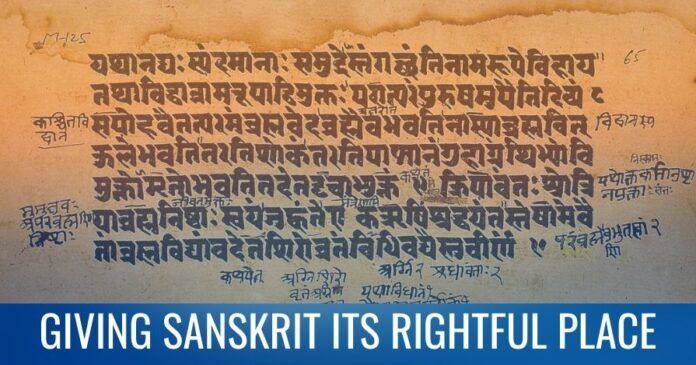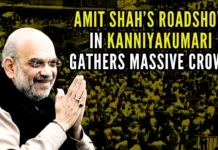
One should hope that the passage of the Bill in Parliament and its endorsement by the President, will finally pave the way for the promotion of Sanskrit in a manner it deserves.
One would imagine that proposed legislation to establish Central universities for the promotion of the country’s ancient language, Sanskrit, would receive unqualified support from lawmakers regardless of party affiliation, After all, Sanskrit is not just a root language for many of the mother-tongues spoken and written across the country today. It is a repository of ancient and civilization wisdom. It contains material which can be (and has been) of use to understand many contemporary issues of science and economics. But, when The Central Sanskrit Universities Bill, 2019, came up for discussion and voting in the Lok Sabha recently, certain Opposition members drawn from the Left and the DMK, raised the (old) bogey of the government ignoring other Indian languages. Predictably, the DMK members engaged in a needless Tamil versus Sanskrit debate.
While the Bill was passed in the Lok Sabha on Thursday, the government assured everyone that it was committed to promoting all Indian languages and that the Sanskrit Bill was not coming in the way of that resolve. To begin with, Central Sanskrit universities would be created by converting three deemed Sanskrit universities — Rashtriya Sanskrit Sansthan and Shri Lal Bahadur Shastri Rashtriya Sanskrit Vidyapeeth (both based in Delhi), and the Rashtriya Sanskrit Vidyapeeth in Tirupati.
The politics over Sanskrit by certain leaders are old. For some strange reason, politicians, especially from Tamil Nadu, have sought to play Tamil against Sanskrit, and in their endeavor, they have seen conspiracies where none exists. In a recent case, DMK members were up in arms over a decision of Anna University to make it mandatory for engineering students to study philosophy which would include the ancient texts of the Upanishads and the Bhagavad Gita. They claimed that it was an attempt to impose Sanskrit over the students. A spokesperson of the party, Manuraj Shunmugasundram, wrote that “the curious imposition of Sanskrit… is much more dangerous to the future of secular India than the imposition of Hindi. Sanskrit is a dead language”. He said that the BJP was trying to impose Sanskrit as part of its communal agenda. “Tamil Nadu’s politics of language and its identities is what stands between the Bharatiya Janata Party and a secular India.”
There can be nothing more ridiculous than this claim. For one, Sanskrit is not a dead language. It is widely in use in the various religious and spiritual rituals that are followed to this day by a vast majority of the people today. Merely because a language is not a regular medium of communication does not render it dead. Rajiv Malhotra’s book, The Battle for Sanskrit: Is Sanskrit Political or Sacred? Oppressive or Liberating? Dead or Alive? should
be an eye-opener for those who believe that the language is past its shelf date or that the ancient texts written in the language promote oppression or discrimination.
Besides, Sanskrit does not threaten any other Indian language, least of all Tamil which has a long and hallowed past. At the same time, it cannot be denied that Sanskrit is a root language for many Indian languages, and if Sanskrit is ‘communal’, then so would be those other languages!
It appears that, at least in the ‘secular’ academic circles in the country, the influence of Western scholars on the subject prevails. The likes of Sheldon Pollock and his many students and followers hold sway over these intellectuals. As Malhotra writes,… ”The secular camp has definitely infiltrated the apparatus of formal Sanskrit studies worldwide”. Thus, it is not just in India but elsewhere to where Sanskrit has been misrepresented and its texts maliciously and mischievously interpreted.
There seems to be anathema in promoting this language. For instance, a few years ago a proposal has been made to replace German with Sanskrit as the third language in Kendriya Vidyalayas, and it had led to a massive controversy. A proposal by yoga guru Baba Ramdev to conduct Vedic studies in educational institutions had also met with opposition. It is strange that efforts to promote the country’s ancient language should run into such obstacles. It’s even more condemnable that Sanskrit should be associated with communalism.
The objectives of the decision to set up Central Sanskrit universities have been laid down in the following words in the Bill:
The up-gradation of three Deemed to be Universities in Sanskrit, namely, Rashtriya Sanskrit Sansthan, Delhi, Sri Lal Bahadur Shastri Rashtriya Sanskrit Vidyapeeth, New Delhi and Rashtriya Sanskrit Vidyapeeth, Triputi into Central Universities through the Central Sanskrit Universities Bill, 2019 would enhance the status of these universities and will give a boost to Post Graduate, Doctoral and Post Doctoral education and Research in the field of Sanskrit and Shastraic education. It would help in getting better faculty, attract foreign students, Sanskrit scholars, foreign faculty of international repute and help in international collaborations with global Universities across the world. This will also help in enhancing the opportunities for imparting education in the field of Indian Philosophy, Yoga, Ayurveda, and Naturopathy.
One should hope that the passage of the Bill in Parliament and its endorsement by the President, will finally pave the way for the promotion of Sanskrit in a manner it deserves. It is time that the pursuit of higher studies in Sanskrit gets a boost. This is important to prepare students and scholars to take on the lobby which has both derided and twisted the language to suit its parochial and prejudiced agenda.
Note:
1. The views expressed here are those of the author and do not necessarily represent or reflect the views of PGurus.











But who stopped the DMK air heads from promoting Tamil? Why can’t they build Tamil Universities all over the world and extol the virtues and greatness of Tamil Literature and culture. This not a zero sum game.
India’s enemies are within. Pakistan is just a fly on the wall.
We have a lot of Tamil words – day to day words derived from Sanskrit– suryan, agni, vayu etc…
Sanskrit is the mother of all languages…
(DMK leaders don’t even know to read n write proper Tamil n the leader family is a telugu family who fool Tamils, so is mdmk leader Vaiko – a telugite who wrongly guides Tamils in the name of tamil)
It’s a missionary plot to degrade Sanskrit n bring in english…
People should understand that their own indian languages open the gateways to heaven and not foreign languages…
Though I support Brahmins for their Hindu bhakthi, i condemn them for their craze for english…
Failing to start Tamil schools or failure to promote Tamil or sanskrit education to their younger generations….
They should have believed in their language too as their religion like Mahakavi Bharathi n worked for its promotion among their younger generations…
Instead they chose convent schools n ended up losing their kids to foreign culture, in many cases..